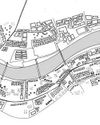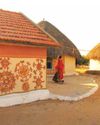Versuchen GOLD - Frei
Dr Cecile Balmond Of Research, Processes And Data
Indian Architect & Builder
|April 2017
Dr Cecil Balmond OBE, is an internationally renowned artist, architect and engineer, known to transcend the conventional boundaries of the discipline, working in the crossover between art and science. Before setting up Balmond Studio in 2011, Balmond was Deputy Chairman of Arup. He was also Chairman of Arup’s European Building Division, and ran the critically acclaimed design group, AGU (Advanced Geometry Unit). Balmond currently holds the Paul Philippe Cret Chair at University of Pennsylvania. He has also been Visiting Saarinen Professor at Yale University School of Architecture, Professor at LSE Urban Cities Programme, and Visiting Kenzo Tange critic, Harvard Graduate School of Architecture.
-

Architectural Design can be divided into three conceptual models; the Classical architectural theory, the Deconstructive theory and the Emergent theory. The traditional architectural model evolves from the Greek theory where a boundary is set around the work with a centre following a grid, which has been followed for over 2000 years with an emphasis on balance, symmetry and harmony we have an inherited legacy. In the deconstruction theory, the model is of a distorted form that displaces the centre, metaphorically, and leads to irregular spacing of structure and form to break the legacy of the box. Emergent theory or methods, where the centre metaphorically is no more within the restrain and organises itself as you go along. This theory opens ways for algorithmic design where information is fed to create new modules. The traditional design spaces the gaps while the emergent model compiles the interval.
The structural system for each of these methods is unique. The classical theory requires a simple post and beam structure, the deconstructed theory requires a distorted understanding of architecture while the Emergent theory which is more indeterminate requires a complicated study of the structure in synchronisation with the algorithms.

Diese Geschichte stammt aus der April 2017-Ausgabe von Indian Architect & Builder.
Abonnieren Sie Magzter GOLD, um auf Tausende kuratierter Premium-Geschichten und über 9.000 Zeitschriften und Zeitungen zuzugreifen.
Sie sind bereits Abonnent? Anmelden
WEITERE GESCHICHTEN VON Indian Architect & Builder

Indian Architect & Builder
Interlacing Perspectives
‘Meraki-2019’ A visionary Seminar series presented by Dr.Baliram Hiray College of Architecture, Bandra(East), Mumbai.
3 mins
November 2019

Indian Architect & Builder
Facilitating A Community Through Architectural Practice
The humble, self-designed, self-built and organically planned home built by the majority of the world population rarely gets appreciated and critiqued as a viable lesson in architectural design.
5 mins
November 2019

Indian Architect & Builder
The Art Of Solving Problems Creatively
The practice of architecture is perhaps incomplete without the complement of a variety of other arts.
3 mins
November 2019

Indian Architect & Builder
Upcycling towards a playful tomorrow
Play is like the middle child, often forgotten, and always taking a back seat. For young kids, play can simply be running around, armwrestling with friends, building sandcastles on the beach, or singing popular music tracks in the shower.
3 mins
November 2019

Indian Architect & Builder
Balancing The Poetics And Pragmatism Of Everyday Design
Humanity is faced with an oxymoronic crisis. The crisis involves the earth, the environment, impending looms of climate change, deforestation, loss of species, dwindling resources etc.
3 mins
November 2019

Indian Architect & Builder
Just Give Me Some Space: Discussions And Beyond
Just Give Me Some Space (JGMSS) is Suha Riyaz Khopatkar’s debut book that paints a portrait of the dynamic life of an architecture student.
17 mins
November 2019

Indian Architect & Builder
The Next In Vernacular Architecture
Architecture has become a capitalist.
5 mins
IAB October 2019

Indian Architect & Builder
Rethinking The Future: Architecture And Its Education
“I want to be like animals, the bird makes a nest in one or two days, the rat digs a hole in a night, but intelligent humans like us spend 30 years to have a house, that’s wrong.” - Jon Jandai
10 mins
IAB October 2019

Indian Architect & Builder
Uniting The Human-Scale With The City-Scale
London-based architect Usman Haque is famed for his interactive architectural systems, and for his exploration of newer, more effective ways of creating human engagement and interaction through his designs. Indian Architect & Builder caught up with him, to quiz him on a variety of topics such as his journey as an architect, his inspirations and philosophies, architects using the digital revolution to their advantage, and more!
6 mins
IAB October 2019

Indian Architect & Builder
Framing spaces
Almost every architect also doubles as a photographer or at least an enthusiast.
5 mins
IAB October 2019
Translate
Change font size

